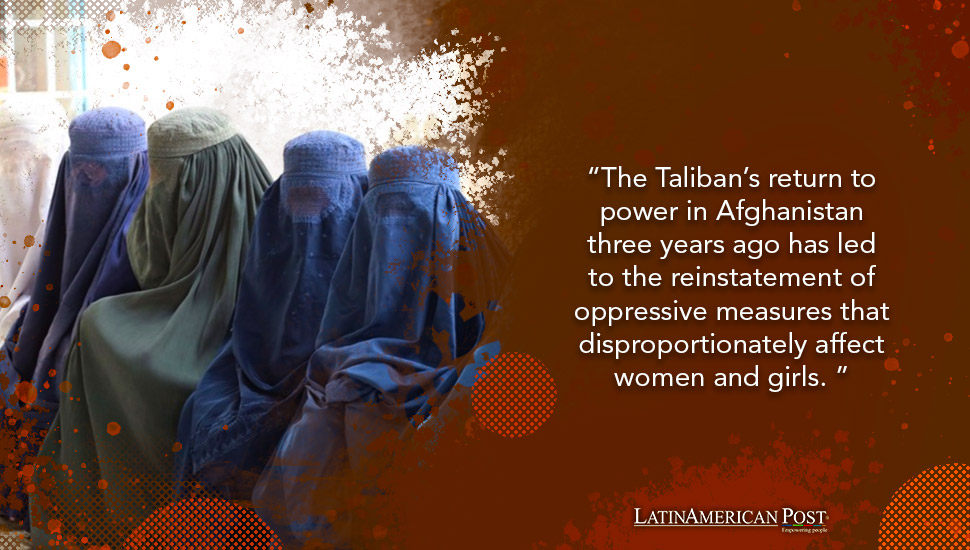Chile Leads Latin America in Condemning Taliban Oppression

Chile’s firm stance against Afghanistan’s oppressive ‘Virtue and Vice Law’ is a critical moment for Latin America. The region must unite in defending human rights, and Chile should lead the way in ensuring that Latin American countries stand together against such injustices.
Chile’s recent condemnation of the Taliban’s ‘Law for the Propagation of Virtue and the Prevention of Vice’ marks a pivotal moment not just for the country but for Latin America as a whole. By openly rejecting this draconian legislation, which seeks to suppress the fundamental human rights of Afghan women, Chile has positioned itself as a leader in the global fight for women’s rights and human dignity. This move should not only be commended but also emulated by other Latin American nations, who must rally behind Chile’s stance and present a united front against such egregious violations of human rights.
The Taliban’s return to power in Afghanistan three years ago has led to the reinstatement of oppressive measures that disproportionately affect women and girls. Among the most alarming aspects of this new legislation is the severe restriction on women’s voices, which can now only be heard in “cases of necessity.” This silencing of over 20 million Afghan women is just one part of a broader strategy to erase their presence from public life. The law also bans women from secondary education, university attendance, and participation in humanitarian work, cutting them off from opportunities for empowerment and self-determination.
The Need for Regional Solidarity
Chile’s response to this crisis is not just a matter of foreign policy; it’s a statement of principle. By standing up against the Taliban’s oppressive measures, Chile is signaling its commitment to universal human rights, particularly those of women and girls, who are often the most vulnerable in times of political and social turmoil. Latin America, as a region with a history of struggles for human rights, should vigorously support this stand.
Latin America has long been a region where the fight for human rights has played a central role in shaping national and regional identities. Latin American nations deeply understand the importance of defending human rights, from the struggles against dictatorship and oppression in the 20th century to the recent battles for social justice and equality. This shared history makes it all the more crucial for Latin American countries to unite in solidarity with Afghan women and girls.
Chile’s leadership is a beacon for the rest of the region. It sets a precedent to encourage other Latin American nations to take similar stands. By doing so, they can collectively send a powerful message to the international community: that Latin America will not stand idly by while women’s rights are trampled upon, no matter where it happens in the world.
Why Chile’s Stand Matters
The global community has a responsibility to respond to human rights violations, mainly when they involve the systematic oppression of vulnerable populations. The Taliban’s ‘Virtue and Vice Law’ represents one of the most severe attacks on women’s rights in the world today. The law’s provisions, which include banning women from speaking publicly, listening to music, using public transportation without a male companion, and participating in any form of entertainment, are a stark reminder of the Taliban’s oppressive rule.
The international outcry against these measures has been strong, with organizations like Amnesty International, Human Rights Watch, and the United Nations all condemning the law. However, global condemnation alone is not enough. Concrete actions must be taken to support Afghan women and to hold the Taliban accountable for their human rights violations. This is where regional leaders like Chile can play a crucial role.
Chile is aligning itself with the broader international community by asserting Latin America’s role in global human rights advocacy. This assertion shows that Latin America is not a passive observer in global affairs but an active participant willing to take bold steps to defend human dignity and freedom. This leadership is critical when international human rights are threatened in many parts of the world.
Latin America’s Opportunity to Lead
Latin America has the opportunity to be a leading voice in the global movement for human rights, and the situation in Afghanistan presents a critical moment for the region to assert its leadership. By joining Chile in condemning the Taliban’s actions, Latin American countries can demonstrate their collective commitment to defending the rights of women and girls everywhere.
This is not just about standing against oppression in Afghanistan; it’s about standing for the principles that define Latin America’s history and identity. The region has a proud tradition of resisting tyranny and fighting for justice, which should guide its response to the crisis in Afghanistan.
Moreover, by taking a united stand, Latin American nations can strengthen their collective influence on the global stage. In recent years, the region has made significant strides in gender equality, social justice, and democratic governance. These achievements have earned Latin America respect and recognition in the international community. Now, by standing together in defense of Afghan women, the region can further solidify its reputation as a global leader in human rights.
The Role of Civil Society and Regional Organizations
For Chile and other Latin American countries to effectively lead in this cause, they must engage both at the governmental level and with civil society and regional organizations. Civil society in Latin America has historically played a vital role in advocating for human rights, and its involvement will be crucial in building a broad-based movement supporting Afghan women.
Regional organizations such as the Organization of American States (OAS) and the Union of South American Nations (UNASUR) should also be mobilized to take a collective stance. These organizations can coordinate regional responses, issue joint statements, and apply diplomatic pressure on the Taliban regime. By working together, Latin American countries can amplify their voices and significantly impact the global stage.
The situation in Afghanistan demands a solid and unified response from the global community. Latin America, with Chile leading the charge, has the opportunity to be a critical voice in this response. It’s a call to action for the region to stand up for the rights of women and girls, defend human dignity, and reject the oppression of vulnerable populations.
Chile’s stance against the Taliban’s ‘Virtue and Vice Law’ is a powerful example of what leadership looks like in the face of injustice. It’s a reminder that the fight for human rights knows no borders and that Latin America has a vital role to play in this global struggle. Now is the time for other Latin American countries to follow Chile’s lead, to stand in solidarity with Afghan women, and to assert their commitment to the principles of freedom, equality, and justice.
Latin America’s Responsibility to Lead
As the world grapples with numerous challenges to human rights, Latin America cannot afford to remain silent. The region’s history, values, and identity are rooted in the struggle for justice and freedom, and these principles must guide its actions on the global stage. Chile’s rejection of the Taliban’s oppressive laws is a call to the entire region to step up, take a stand, and lead in the defense of human rights.
Also read: Climate Change’s Fiery Wrath: Chile’s Wildfire Catastrophe Signals Global Alarm
By coming together, Latin American nations can send a clear message to the Taliban and the international community: that the rights of women and girls are non-negotiable, and that Latin America will always stand on the side of justice and equality. The time for action is now, and the responsibility to lead is one that Latin America must embrace.





